~ W. H. Auden
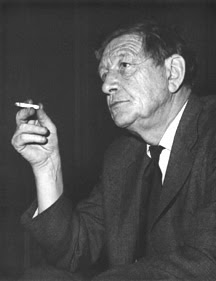
- Il palmo offerto per il benvenuto:
Guarda! Per te
ho disserrato il pugno.
Nato a York, in Inghilterra, il 21 febbraio 1907, vissuto per tre decenni in America, morto in Austria, a Kirchstetten, il 29 settembre 1973, Wystan Hugh Auden è stato uno dei pochi grandi poeti di metà Novecento.
L’aver vissuto dal 1936 al 1945 fra guerra civile spagnola e seconda guerra mondiale un cruciale passaggio d’epoca, con tutti i mutamenti di situazione storica e letteraria, fa di lui un maestro in bilico fra le due metà del secolo e proprio per questo ancora in gran parte da riscoprire e da interpretare.
Auden esordì negli anni Trenta come scrittore impegnato e di sinistra, come ironico e sarcastico demistificatore della cultura borghese e leader letterario di un gruppo di giovani autori studenti a Oxford, tra cui Christopher Isherwood, Cecil Day Lewis, Louis MacNeice, Stephen Spender. Nel 1937 partecipò brevemente come autista del soccorso medico alla guerra civile spagnola. L’anno prima aveva sposato la figlia di Thomas Mann, Erika, allo scopo di farle ottenere il passaporto inglese e permetterle di uscire dalla Germania nazista. Nel 1939 Auden si trasferisce con Isherwood negli Stati Uniti suscitando parecchie reazioni polemiche, dato che il loro gesto venne interpretato come una diserzione morale dall’Inghilterra e dall’Europa minacciate da Hitler.
Prenderà la cittadinanza americana nel 1946 e diventerà sempre di più uno scrittore ammirato nell’ambiente newyorkese, esercitando una notevole influenza su poeti più giovani come John Ashbery.
Negli anni inglesi aveva conosciuto T.S. Eliot (che lo pubblicò per la prima volta sulla sua rivista Criterion) e fu amico di E.M. Forster. Negli anni americani fu in contatto fra l’altro con intellettuali e scrittori tedeschi come Klaus Mann, Erich Heller e Hannah Arendt. Per la sua cultura ebbero una fondamentale importanza sia la filosofia e la critica sociale (Marx e Freud all’inizio, poi Kierkegaard e Simone Weil), sia il teatro (Shakespeare, Ibsen) e il teatro musicale (Mozart, Verdi).
Oltre che da Yeats e da Eliot, in gioventù fu influenzato da Rilke (per poco e negativamente, disse) poi soprattutto da Brecht e più tardi da Karl Kraus (con Isherwood era stato a Berlino per ragioni di studio nel 1928-29).
Negli anni Cinquanta Auden trascorreva metà dell’anno a New York e metà a Ischia. In seguito sostituì l’isola napoletana sempre più rumorosa con il piccolo villaggio austriaco di Kirchstetten, vicino Vienna. Con il suo compagno Chester Kallman scrisse alcuni libretti d’opera, tra cui quello per La carriera di un libertino di Igor Stravinskij, che andò in scena nel 1951 alla Fenice di Venezia.
Tra i suoi libri di poesia più importanti e noti, Un altro tempo (1940), L’età dell’ansia (1947), e la breve raccolta postuma Grazie, nebbia (1974). Assai rilevante è la sua attività di saggista, documentata soprattutto nel volume La mano del tintore (1962).
CANZONE
Pesci nei placidi laghi
sfoggiano scie di colori,
cigni nell'aria invernale
hanno un candore perfetto
e incede il grande leone
per il suo bosco innocente;
leone, pesci e cigno
in scena e già sono andati
sull'onda irruente del Tempo.
Noi, finchè i giorni d'ombra son maturi,
noi dobbiamo piangere e cantare
del dovere il sopruso consapevole,
il Diavolo nell'orgoglio,
la bontà portata attentamente
per espiazione o per nostra fortuna;
noi i nostri amori li dobbiamo perdere,
volgendo uno sguardo invidioso
a ogni animale e uccello che si muove.
Sospiri per folliecompiute e dette
attorcono i nostri angusti giorni,
ma devo benedire e celebrare
che tu, mio cigno, avendo
tutti i doni che Natura
impulsiva ha dato al cigno,
la maestà e l'orgoglio,
vi aggiungessi ieri notte
il tuo amore volontario.
~ ~ ~ ~ ~ ~ ~ ~ ~ ~
(Questa poesia è un’altra "canzone" di Auden, diversa da quella sopra riportata, ma altrettanto bella – l’ho solo nella versione originale inglese...)
CANZONE
When shall we learn, what should be clear as day,
We cannot choose what we are free to love?
Although the mouse we banished yesterday
Is an enraged rhinoceros today,
Our value is more threatened than we know:
Shabby objections to our present day
Go snooping round its outskirts; night and day
Faces, orations, battles, bait our will
As questionable forms and noises will;
Whole phyla of resentments every day
Give status to the wild men of the world
Who rule the absent-minded and this world.
We are created from and with the world
To suffer with and from it day by day:
Whether we meet in a majestic world
Of solid measurements or a dream world
Of swans and gold, we are required to love
All homeless objects that require a world.
Our claim to own our bodies and our world
Is our catastrophe. What can we know
But panic and caprice until we know
Our dreadful appetite demands a world
Whose order, origin, and purpose will
Be fluent satisfaction of our will?
Drift, Autumn, drift; fall, colours, where you will:
Bald melancholia minces through the world.
Regret, cold oceans, the lymphatic will
Caught in reflection on the right to will:
While violent dogs excite their dying day
To bacchic fury; snarl, though, as they will,
Their teeth are not a triumph for the will
But utter hesitation. What we love
Ourselves for is our power not to love,
To shrink to nothing or explode at will,
To ruin and remember that we know
What ruins and hyaenas cannot know.
If in this dark now I less often know
That spiral staircase where the haunted will
Hunts for its stolen luggage, who should know
Better than you, beloved, how I know
What gives security to any world.
Or in whose mirror I begin to know
The chaos of the heart as merchants know
Their coins and cities, genius its own day?
For through our lively traffic all the day,
In my own person I am forced to know
How much must be forgotten out of love,
How much must be forgiven, even love.
Dear flesh, dear mind, dear spirit, O dear love,
In the depths of myself blind monsters know
Your presence and are angry, dreading Love
That asks its image for more than love;
The hot rampageous horses of my will,
Catching the scent of Heaven, whinny: Love
Gives no excuse to evil done for love,
Neither in you, nor me, nor armies, nor the world
Of words and wheels, nor any other world.
Dear fellow-creature, praise our God of Love
That we are so admonished, that no day
Of conscious trial be a wasted day.
Or else we make a scarecrow of the day,
Loose ends and jumble of our common world,
And stuff and nonsense of our own free will;
Or else our changing flesh may never know
There must be sorrow if there can be love.
* * *
OH, COS'È QUESTO RUMORE
Oh, cos'è quel rumore lancinante
giù nella valle, un rullare, un rullare?
Nient'altro che i soldati in marcia, caro,
i soldati scarlatti.
Oh, cos'è quella luce che mi abbaglia
in lontananza come un lampo, un lampo?
Non è che il sole sulle armi, caro,
mentre avanzano svelti.
Oh, che fanno con tutti quegli arnesi,
cosa faranno stamane, stamane?
Solo manovre, come sempre, caro,
o forse è un segnale.
Oh, perché sono usciti in strada
e voltano il capo, in fila, in fila?
Sarà arrivato un contrordine, caro.
Ma perché ti inginocchi?
Oh, non si sono fermati dal dottore
né frenano i cavalli, i cavalli?
Bé, di feriti non ne hanno, caro,
nessuno in quei reparti.
Oh, è il parroco che cercano, quel vecchio
tutto bianco, sarà lui, sarà lui?
No, vanno oltre, oltre il cancello, caro,
senza fargli visita.
Oh, toccherà al fattore qui accanto,
a lui che è così furbo, così furbo?
La fattoria l'hanno passata, caro,
e già stanno correndo.
Oh, dove vai? Rimani qui con me!
Le tue promesse erano inganni, inganni?
No, ho giurato di amarti, caro,
ma ora devo andare.
Oh, è rotto il chiavistello, è a pezzi l'uscio,
oh, la via che hanno scelto è questa, è questa;
hanno così pesanti gli stivali
e hanno occhi di fuoco.
O WHAT IS THAT SOUND
O what is that sound which so thrills the ear
Down in the valley drumming, drumming?
Only the scarlet soldiers, dear,
The soldiers coming.
O what is that light I see flashing so clear
Over the distance brightly, brightly?
Only the sun on their weapons, dear,
As they step lightly.
O what are they doing with all that gear,
What are they doing this morning, morning?
Only their usual manoeuvres, dear,
Or perhaps a warning.
O why have they left the road down there,
Why are they suddenly wheeling, wheeling?
Perhaps a change in their orders, dear,
Why are you kneeling?
O haven't they stopped for the doctor's care,
Haven't they reined their horses, horses?
Why, they are none of them wounded, dear,
None of these forces.
O is it the parson they want, with white hair,
Is it the parson, is it, is it?
No, they are passing his gateway, dear,
Without a visit.
O it must be the farmer that lives so near.
It must be the farmer so cunning, so cunning?
They have passed the farmyard already, dear,
And now they are running.
O where are you going? Stay with me here!
Were the vows you swore deceiving, deceiving?
No, I promised to love you, dear,
But I must be leaving.
O it's broken the lock and splintered the door,
O it's the gate where they're turning, turning;
Their boots are heavy on the floor
And their eyes are burning.
* * *
(non ho trovato l’originale inglese)
SOTTO UN ABIETTO SALICE
Sotto un abietto salice
non ti affliggere più, innamorato:
segua al pensiero rapida azione.
A che serve pensare?
La tua incessante prostrazione
mostra quanto sei freddo;
alzati, su, e ripiega
la tua mappa di desolazione.
I rintocchi che scorrono sui prati
da quella fosca guglia
suonan per queste ombre senza amore
che all'amore non servono.
Ciò che è vivo può amare: perché ancora
piegarsi alla sconfitta
con le braccia incrociate?
Attacca e vincerai.
Stormi di anatre in volo sul tuo capo
e sanno dove andare,
freddi ruscelli in corsa ai tuoi piedi
e vanno verso l'oceano.
Cupa e opaca è la tua costernazione:
cammina, dunque, vieni,
non più così tarpato
in preda alla tua soddisfazione.
* * *
NINNANANNA
Posa il capo assopito, amore mio,
umano sul mio braccio senza fede;
tempo e febbri avvampino e cancelliano
ogni bellezza individuale, via
dai bambini pensosi, e poi la tomba
attesta che effimero è il bambino:
ma finch'è spunti il giorno mi rimanga
tra le braccia la viva creatura,
mortale sì, colpevole, eppure
per me il bello nella sua interezza.
Anima e corpo non hanno confini:
agli amanti che giacciono sul suo
tollerante declivio incantato
in preda al deliquio ricorrente,
solenne la visione manda Venere
di soprannaturale armonia,
di universale amore e speranza;
mentre un'astratta intuizione accende,
in mezzo ai ghiacciai e fra le rupi,
dell'eremita l'estasi carnale.
Passano sicurezze e fedeltà
allo scoccare della mezzanotte
come le vibrazioni di campana,
e forsennati alla moda lanciano
il loro pedantesco, uggioso grido:
il costo fino all'ultimo centesimo
- sta scritto in tutte le temute carte -
andrà pagato, ma da questa notte
non un solo bisbiglio, nè un pensiero,
non un bacio o uno sguardo sia perduto.
Bellezza muore, e mezzanotte, ed estasi:
che i venti dell'alba, mentre lievi
spirano intorno al tuo capo sognante,
mostrino un giorno di accoglienza tale
che occhio e cuore pulsino e gioiscano,
paghi di un mondo, il nostro, che è mortale;
meriggi di arsura ti ritrovino
nutrito dei poteri involontari,
notti di oltraggio ti lascino andare
sorvegliato da ogni umano amore.
LULLABY
Lay your sleeping head, my love,
Human on my faithless arm;
Time and fevers burn away
Individual beauty from
Thoughtful children, and the grave
Proves the child ephemeral:
But in my arms till break of day
Let the living creature lie,
Mortal, guilty, but to me
The entirely beautiful.
Soul and body have no bounds:
To lovers as they lie upon
Her tolerant enchanted slope
In their ordinary swoon,
Grave the vision Venus sends
Of supernatural sympathy,
Universal love and hope;
While an abstract insight wakes
Among the glaciers and the rocks
The hermit's carnal ecstasy.
Certainty, fidelity
On the stroke of midnight pass
Like vibrations of a bell
And fashionable madmen raise
Their pedantic boring cry:
Every farthing of the cost,
All the dreaded cards foretell,
Shall be paid, but from this night
Not a whisper, not a thought,
Not a kiss nor look be lost.
Beauty, midnight, vision dies:
Let the winds of dawn that blow
Softly round your dreaming head
Such a day of welcome show
Eye and knocking heart may bless,
Find our mortal world enough;
Noons of dryness find you fed
By the involuntary powers,
Nights of insult let you pass
Watched by every human love
* * *
JOHNNY
Oh, la valle in estate dove io e il mio John
lungo il profondo fiume andavamo su e giù
mentre i fiori nell'erba e gli uccelli nell'aria
ragionavano dolci del reciproco amore,
e io sulla sua spalla dicevo: "Su, giochiamo":
ma lui con un cipiglio di tuono se ne andò.
Oh, il venerdì ricordo, era sotto Natale,
quando noi due andammo a quel ballo benefico,
così liscia la pista e chiassosa l'orchestra,
e Johnny così bello che ero così fiera;
"Stringimi forte, Johnny, balliamo fino all'alba":
ma lui con un cipiglio di tuono se ne andò.
Scorderò mai la sera nel palco al gran galà
quando pioveva musica da ogni ugola stupenda?
Pendevano abbaglianti le perle e i diamanti
da ogni abito di seta argentata o dorata:
"Oh, Johnny, mi sento in cielo" io dissi in un bisbiglio:
ma lui con un cipiglio di tuono se ne andò.
Oh sì, ma era bello come un giardino in fiore,
alto e slanciato come la grande Torre Eiffel,
quando si spense il valzer sull'ampia promenade
oh, quel sorriso e gli occhi mi andaron dritti al cuore;
"Oh, caro Johnny, sposami, ti amerò e obbedirò":
Ma lui con un cipiglio di tuono se ne andò.
Oh, questa notte, Johnny, io ti ho sognato, amore,
su un braccio avevi il sole e sull'altro la luna,
tutto azzurro era il mare ed era verde l'erba,
ogni stella agitava un tamburello tondo;
io ero in un abisso giù a diecimila miglia:
ma tu con un cipiglio di tuono te ne andavi.
JOHNNY
O the valley in the summer where I and my John
Beside the deep river would walk on and on
While the flowers at our feet and the birds up above
Argued so sweetly on reciprocal love,
And I leaned on his shoulder; 'O Johnny, let's play':
But he frowned like thunder and he went away.
O that Friday near Christmas as I well recall
When we went to the Charity Matinee Ball,
The floor was so smooth and the band was so loud
And Johnny so handsome I felt so proud;
'Squeeze me tighter, dear Johnny, let's dance till it's day':
But he frowned like thunder and he went away.
Shall I ever forget at the Grand Opera
When music poured out of each wonderful star?
Diamonds and pearls they hung dazzling down
Over each silver and golden silk gown;
'O John I'm in heaven,' I whispered to say:
But he frowned like thunder and he went away.
O but he was fair as a garden in flower,
As slender and tall as the great Eiffel Tower,
When the waltz throbbed out on the long promenade
O his eyes and his smile they went straight to my heart;
'O marry me, Johnny, I'll love and obey':
But he frowned like thunder and he went away.
O last night I dreamed of you, Johnny, my lover,
You'd the sun on one arm and the moon on the other,
The sea it was blue and the grass it was green,
Every star rattled a round tambourine;
Ten thousand miles deep in a pit there I lay:
But you frowned like thunder and you went away.
* * *
ALLA FINE IL SEGRETO VIENE FUORI
Alla fine il segreto viene fuori,
come deve succedere ogni volta,
è matura la deliziosa storia
da raccontare all'amico del cuore;
davanti al tè fumante e nella piazza
la lingua ottiene quello che voleva;
le acque chete corrono profonde
mio caro, non c'è fumo senza fuoco.
Dietro il morto in fondo al serbatoio,
dietro il fantasma sul prato da golf,
dietro la dama che ama il ballo e dietro
il signore che beve come un matto,
sotto l'aspetto affaticato,
l'attacco di emicrania e il sospiro
c'è sempre un'altra storia,
c'è più di quello che si mostra all'occhio.
Per la voce argentina che d'un tratto
canta lassù dal muro del convento,
per l'odore che viene dai sanbuchi,
per le stampe di caccia nell'ingresso,
per le gare di croquet in estate,
la tosse, il bacio, la stretta di mano,
c'è sempre un segreto malizioso,
un motivo privato in tutto questo.
AT LAST THE SECRET IS OUT
At last the secret is out,
as it always must come in the end,
the delicious story is ripe to tell
to tell to the intimate friend;
over the tea-cups and into the square
the tongues has its desire;
still waters run deep, my dear,
there's never smoke without fire.
Behind the corpse in the reservoir,
behind the ghost on the links,
behind the lady who dances
and the man who madly drinks,
under the look of fatigue
the attack of migraine and the sigh
there is always another story,
there is more than meets the eye.
For the clear voice suddenly singing,
high up in the convent wall,
the scent of the elder bushes,
the sporting prints in the hall,
the croquet matches in summer,
the handshake, the cough, the kiss,
there is always a wicked secret,
a private reason for this.
* * *
BLUES IN MEMORIA
Fermate tutti gli orologi, isolate il telefono,
fate tacere il cane con un osso succulento,
chiudete i pianoforti e fra un rullio smorzato
portate fuori il feretro, si accostino i dolenti.
Incrocino gli aereoplani lassù
e scrivano sul cielo il messaggio Lui È Morto,
allacciate nastri di crespo al collo bianco dei piccioni,
i vigili si mettano i guanti di tela nera.
Lui era il mio Nord, il mio Sud, il mio Est ed il mio Ovest,
la mia settimana di lavoro e il mio riposo la domenica,
il mio mezzodì, la mezzanotte, la mia lingua, il mio canto;
pensavo che l'amore fosse eterno: avevo torto.
Non servono più le stelle: spegnetele anche tutte;
imballate la luna, smontate pure il sole;
svuotatemi l'oceano e sradicate il bosco;
perché ormai nulla può giovare.
FUNERAL BLUES
Stop all the clocks, cut off the telephone,
Prevent the dog from barking with a juicy bone,
Silence the pianos and with muffled drum
Bring out the coffin, let the mourners come.
Let aeroplanes circle moaning overhead
Scribbling on the sky the message He Is Dead,
Put crêpe bows round the white necks of the public doves,
Let the traffic policemen wear black cotton gloves.
He was my North, my South, my East and West,
My working week and my Sunday rest,
My noon, my midnight, my talk, my song;
I thought that love would last for ever: I was wrong.
The stars are not wanted now: put out every one;
Pack up the moon and dismantle the sun;
Pour away the ocean and sweep up the wood.
For nothing now can ever come to any good.
Etichette: Auden, poesia, traduzione
 ...e tu?
...e tu?









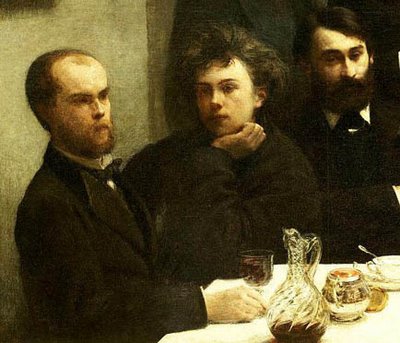



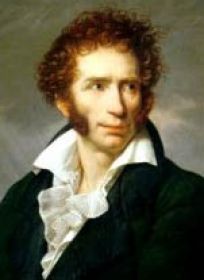






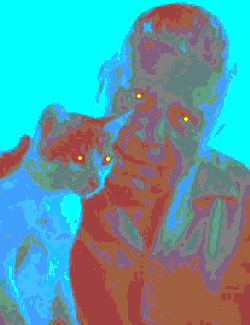


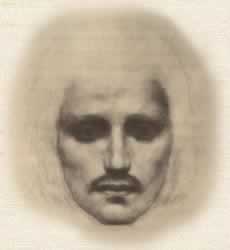

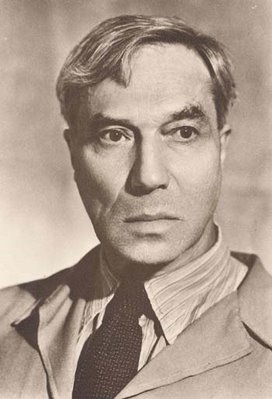
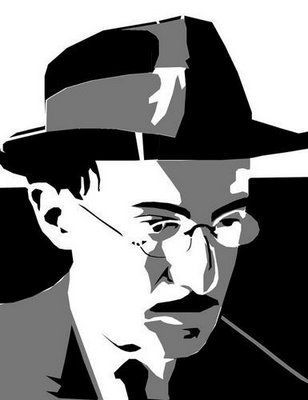




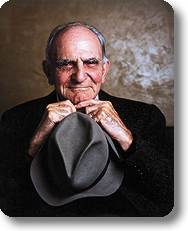


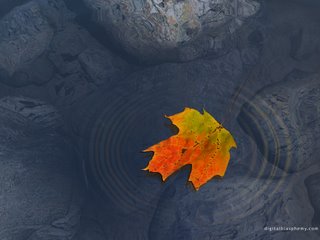


Beautiful.....to the mind....to the eyes ... to the heart which assimilates the essence of this beautiful poetry . Legend....I love his poetry.
@Knitting stories: ...I love it too and, speaking of love, what about this poem of mine, which I wrote in three languages, while the fourth below was translated into Hindi by a lady friend of mine?
NAACHTE DEEWANE
Main kaise nachoongin?
Main apne dil ko naachne doongin
Main kaise gaongeen?
Main apne dil ko gaane doongin
Par tum...tum kaise naachoge?
Apne dil ko udne do hawa ke paas
Main us neele aasmaan se utrungan
Aao, mere saath is roshni me naacho
Saare deewane naach rahen hain
Is ssoraj ki roshni mein
Aur jiska dil hamare saath mil ke nahi naachta
Woh pathar ka ho jaayega...aur fir choor choor ho jaayega
(you'll find the 4 originals under QUADRILINGUAL MADRIGAL at my blog:
Dancing Lovers)
Beautiful poem and beautifully translated. Thanks for sharing.